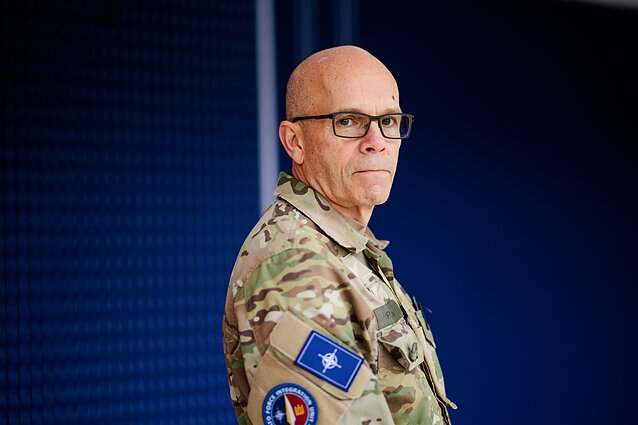
This week, Lithuania’s public broadcaster LRT.lt published an interview with the Commander of the NATO Force Integration Unit (NFIU) in Lithuania, Colonel Peter Nielsen. In his opinion, after the war in Ukraine, Russia will rebuild its capabilities and continue to pose a threat. But Russia’s Kaliningrad exclave, bordering Lithuania and Poland, will become less of an issue to NATO with Finland and Sweden’s accession, said the commander.
The current security situation in the region has changed since the Russian invasion of Ukraine because initially, Russia used all its professional standing forces from everywhere in Russia – raging from the Far East to Murmansk. They were put around Ukraine and were part of the attack. Russia has started to rebuild, but its focus is 100 percent on Ukraine now.
“When the war ends, Russia will rebuild, and then there will be a probably stronger Russia with a willingness to use its strength. So, the capacity and the willingness to use it give us a measure of the threat.”
Asked about changes he has seen in the country’s defence and security over the years he has been posted in Lithuania, Col. Nielsen noted that a lot of good things have been done, with new equipment coming in, and interesting procurement plans. The infrastructure is being built with barracks and training areas.
“If I tried to imagine a perfect situation in a frontline country, I would look at Ukraine, but also at Israel and Finland. These are the countries that have been on the frontline and have maintained this comprehensive defence, where the whole society is involved. This is probably an area where you could still do more, i.e., to involve the whole society in this…not just the Armed Forces and it’s not just NATO. It’s all of Lithuania: the hospitals, teachers, everyone in Lithuania.”
Regarding Kaliningrad, Col. Nielsen said it is still an issue for NATO, but the ascension of Finland and the upcoming ascension of Sweden will totally change the setup in the Baltic Sea region. “Russia will experience Kaliningrad being surrounded, but it will still be an issue for us because there are capabilities in Kaliningrad. We still need to take this into consideration and make plans for it, but it is now totally surrounded, so Russians need to make plans to reinforce it and have connections to the exclave in wartime.”
The Suwalki Gap is still a very important territory, as it is NATO’s land link to the three Baltic states. Of course, Finland and Sweden are quite close. Now, Sweden’s Gotland island in the Baltic Sea will be very important as an “unsinkable carrier”, where planes could take off and land in the event of a war in the Baltics, and where essential supplies could be delivered. Nevertheless, the Suwalki Gap would still have to be kept open, said the Colonel.
In his view, there is still a very large concentration of military assets in Kaliningrad, but the conventional war-fighting assets are being taken out of Kaliningrad and sent to Ukraine. “What we see in Kaliningrad is what we see in other Russian regions as well, including the border with Finland. Kaliningrad is not as much of a threat as it used to be, but it’s still an issue because Lithuania would have to fight a war on two fronts, so to speak.”
In assessing the situation on the Ukrainian battelfield, Nielsen sees a frozen front now where Ukraine is trying to attack just small bits in one area, and Russians are trying to attack in another area. “There are small tactical gains, but the big picture doesn’t really change. It’s important to note that this is the land war we are talking about.” However, the Russian Navy now has difficulties manoeuvring in the Black Sea because of Ukraine’s attacks. They forced the Russian navy away from Sevastopol to the eastern part of the Black Sea, which was a major feat for the Ukrainians.
“But winter is coming, and we will see stalled action on land, so we’ll wait for spring. I hope that help from the West will continue to flow in, and that we will help Ukraine to train its forces so that they will be able to win in the end.”
Damage done to the Balticconector pipeline linking Finland and Estonia, begs the question of what to do to ensure the security of other infrastructure in the Baltic Sea. Col. Nielsen’s advice is that first, “we need to acknowledge that there’s a hybrid war with Russia going on right now, and we need to confront Russia in the hybrid domain”. The key is to continue support for Ukraine and also build each country’s own defence and capabilities to counter the direct threat within this hybrid warfare.
The biggest threat is the hybrid war that will continue. Disruption of our societies, the constant attack with false information and fake news, trying to influence the voters, is something that will probably continue. “We need to be aware of this and not neglect it .”
Going forward, the task will not be simple. “There was a denazification of Germany after the Second World War. We need a deputinization in Russia to make them into a peaceful country like Germany has become.”
Would Russia be willing to go to war against NATO? “Russia will do whatever it can not to start this war because, I think, they know they should not mess with NATO.”



























